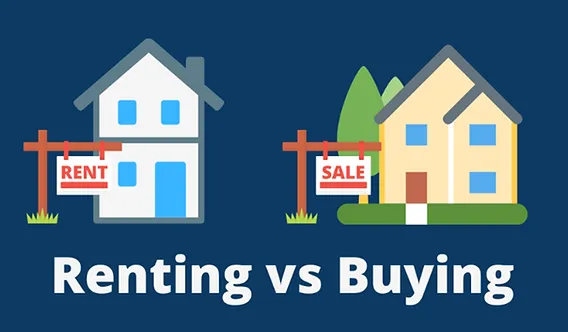When it comes to securing a place to live, one of the biggest financial decisions you’ll ever make is whether to rent or buy a home. Both options have their pros and cons, and what makes the most sense financially often depends on personal circumstances, lifestyle preferences, market conditions, and long-term goals.
In this detailed guide, we’ll break down the financial implications of renting vs. buying, compare the short-term and long-term costs, and help you make an informed decision. Whether you’re a first-time homebuyer or a lifelong renter, this article will provide valuable insights to guide your next move.
Table of Contents
- Understanding the Basics: Renting vs. Buying
- The Financial Pros of Renting a Home
- The Financial Pros of Buying a Home
- Hidden Costs to Consider
- Building Equity vs. Paying Rent
- Market Factors That Influence the Decision
- Lifestyle Considerations
- Renting vs. Buying Calculator: A Useful Tool
- Case Studies and Real-Life Examples
- Final Verdict: Which Option Makes More Financial Sense?
1. Understanding the Basics: Renting vs. Buying
Renting a home means paying a landlord a monthly fee to live in a property without owning it. Buying a home involves taking out a mortgage (in most cases) and gradually gaining ownership as you pay off your loan.
While the concept seems straightforward, the financial implications of each choice are far more complex.
2. The Financial Pros of Renting a Home
Renting offers several financial advantages, especially for those who value flexibility or are not ready for the long-term commitment of homeownership.
✅ Lower Initial Costs
Renting typically requires:
- A security deposit (usually 1-2 months’ rent)
- First and last month’s rent
This is significantly lower than the upfront costs of buying a home, which include:
- A down payment (often 5–20% of the home price)
- Closing costs
- Inspection fees
- Appraisal charges
✅ No Maintenance Expenses
Renters are usually not responsible for:
- Repairs
- Maintenance
- Property taxes
This can lead to substantial annual savings, especially if major issues like roofing, plumbing, or HVAC systems arise.
✅ Flexibility to Move
If your job, relationship, or lifestyle requires frequent relocation, renting is the more financially sensible option. You’re not tied down by a mortgage or the process of selling a home.
✅ Less Financial Risk
Renters don’t bear the burden of:
- Falling home values
- Market downturns
- Unexpected property-related costs
3. The Financial Pros of Buying a Home
While buying a home comes with a higher upfront cost, it also has long-term financial benefits.
✅ Building Equity
Every mortgage payment brings you one step closer to owning your home outright. Over time, you build home equity, which is a valuable financial asset.
✅ Appreciation in Value
Real estate often appreciates over time. Depending on the market, your home could significantly increase in value, offering a solid return on investment (ROI).
✅ Tax Benefits
Homeowners may qualify for tax deductions on:
- Mortgage interest
- Property taxes
- Some closing costs
These deductions can reduce your overall tax burden.
✅ Stable Monthly Payments
With a fixed-rate mortgage, your monthly payments remain the same, unlike rent, which tends to increase annually.
✅ Personal Freedom
Homeownership allows:
- Renovations
- Customizations
- Pet ownership
- Long-term stability
These freedoms can enhance quality of life, which in turn supports financial wellness through consistent living costs and asset growth.
4. Hidden Costs to Consider
It’s easy to overlook certain hidden costs associated with both renting and buying.
Hidden Costs of Renting
- Rent increases at lease renewal
- Non-refundable deposits
- Limited ability to control utility costs
- Move-out cleaning or repair fees
Hidden Costs of Buying
- Homeowner’s insurance
- Private mortgage insurance (PMI)
- Property taxes
- HOA fees (if applicable)
- Maintenance and repairs
- Closing and legal fees
Understanding these costs is crucial in making a financially sound decision.
5. Building Equity vs. Paying Rent
One of the strongest arguments for buying a home is equity building.
What Is Equity?
Equity is the portion of your home you truly “own.” It increases as:
- You pay down your mortgage
- Your home appreciates in value
Renting = No Return
With renting, your monthly payment provides shelter but no long-term return. You’re essentially helping someone else build equity—your landlord.
However, renters can still build wealth by investing the money they would otherwise spend on homeownership costs. So, it’s not always a one-way street.
6. Market Factors That Influence the Decision
Several external factors can tip the scale in favor of renting or buying:
Current Real Estate Market
- In a seller’s market, home prices are high, which may make renting more appealing.
- In a buyer’s market, deals may be more favorable for purchasing a home.
Mortgage Rates
- Lower interest rates reduce the cost of borrowing.
- High mortgage rates may make monthly payments unaffordable.
Rental Market Trends
- In high-rent areas, buying could be more economical over time.
- In cities with low rent and high property costs, renting might save you money.
Inflation
Real estate is a hedge against inflation, while rent prices often rise with inflation, impacting renters more heavily.
7. Lifestyle Considerations
Your lifestyle and goals also play a major role in this decision.
Rent If You:
- Expect to move within the next 3-5 years
- Want less responsibility
- Are early in your career or starting fresh
- Prefer access to amenities without ownership costs
Buy If You:
- Plan to stay in one place long-term
- Want to customize your space
- Are ready for a long-term investment
- Have stable income and savings for a down payment
8. Renting vs. Buying Calculator: A Useful Tool
A rent vs. buy calculator can help you analyze:
- Monthly costs
- Long-term savings or expenses
- Break-even point (where buying becomes more beneficial)
These tools use data such as:
- Monthly rent
- Home price
- Mortgage rate
- Property tax
- Expected time in the home
Several financial websites and real estate platforms offer free calculators that you can use to run personalized scenarios.
9. Case Studies and Real-Life Examples
Example 1: Renting Wins
Jake, a software developer in San Francisco, chose to rent a $3,000/month apartment instead of buying a $1.2M condo. He invested the money saved on a down payment in index funds. Over 5 years, the value of the condo rose 8%, but Jake’s investments grew by 11%, and he retained flexibility to relocate.
Example 2: Buying Wins
Maria and Daniel, a young couple in Austin, bought a $350,000 starter home with a fixed-rate mortgage. Over 7 years, the property appreciated by 20%, and they built $100,000 in equity. Their monthly payments were lower than comparable rent, and they enjoyed stability and control over their space.
10. Final Verdict: Which Option Makes More Financial Sense?
There is no one-size-fits-all answer. The financially smarter choice depends on:
- Your local market conditions
- How long you plan to stay in the home
- Your financial readiness (debt, savings, credit score)
- Personal goals and lifestyle
Renting is Often Better If:
- You need flexibility
- You’re not ready for long-term financial commitment
- The housing market is overpriced in your area
Buying is Often Better If:
- You plan to stay put for at least 5-7 years
- You’re financially stable
- You’re in a growing market where property values are appreciating
Conclusion: Think Long-Term, Not Just Monthly
It’s easy to focus on monthly rent vs. mortgage payments, but long-term financial implications are just as important. Buying a home can be a powerful tool for wealth-building, but only if done at the right time and in the right market. Renting can offer flexibility, low upfront costs, and fewer responsibilities.
By analyzing your financial situation, goals, and market conditions, you can confidently decide whether renting or buying makes more financial sense for your future.
Frequently Asked Questions (FAQs)
Is renting always throwing money away?
No. Renting offers value through flexibility, lower risk, and fewer upfront costs. It’s not a waste if it aligns with your financial goals.
How long should I plan to stay in a home before buying?
Generally, if you plan to stay 5 years or more, buying is often more cost-effective due to equity gains and appreciation.
What if I buy a home and the market crashes?
Home values fluctuate. If you plan to stay long-term, temporary market dips may not impact you significantly.
🎁 Want a Surprise?
Click here to get redirected to a random post


